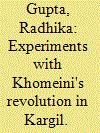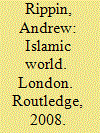|
|
|
Sort Order |
|
|
|
Items / Page
|
|
|
|
|
|
|
| Srl | Item |
| 1 |
ID:
131783


|
|
|
|
|
| Publication |
2014.
|
| Summary/Abstract |
Shi'i scholars from India have been a sizeable presence in seminaries in Iran and Iraq, both historically and today. Yet there is a dearth of scholarship on Shi'i linkages between India and West Asia, with the exception of historical work on the patronage of shrine cities in Iraq by centres of Shi'ism in India. Departing from this geographical and historical focus, this paper lends insight into contemporary religious networks between India and West Asia, using the example of the Twelver Shi'a in Kargil, a region located on India's 'border' with Pakistan in the province of Kashmir. Kargili scholars travelled overland via Afghanistan or by sea from Bombay to Basra to study in seminaries in Iraq and Iran from the nineteenth century onwards. Increasing fluency in Urdu in post-colonial India enabled them to connect with Shi'i institutions in other parts of India, which mediate religious, cultural, and financial flows from a transnational Shi'ite realm. These networks of religious learning are not only conduits for the transmission of textual, doctrinal knowledge, but also for politico-religious ideologies that are selectively harnessed, and often exaggerated, to effect significant social and political changes in micro-locales. While local conflicts are over-determined by the evocation of transnational links, they also reflect, even if only through rhetorical and partial reproduction, doctrinal and politico-religious schisms among Shi'i leaders in West Asia. This is illustrated by an ethnographic account of the activities undertaken and contestations provoked by the Imam Khomeini Memorial Trust in Kargil, a modernist reform movement that has selectively appropriated Khomeini's revolutionary ideologies to instigate social change and shape local politics and religious practice in Kargil.
|
|
|
|
|
|
|
|
|
|
|
|
|
|
|
|
| 2 |
ID:
085384


|
|
|
|
|
| Publication |
London, Routledge, 2008.
|
| Description |
xx, 678p.Hbk
|
| Standard Number |
0415364078
|
|
|
|
|
|
|
|
|
|
|
|
Copies: C:1/I:0,R:0,Q:0
Circulation
| Accession# | Call# | Current Location | Status | Policy | Location |
| 054021 | 909.097671/RIP 054021 | Main | On Shelf | General | |
|
|
|
|
| 3 |
ID:
081983


|
|
|
|
|
| Publication |
2008.
|
| Summary/Abstract |
This article examines the assertion, widespread in both media and academia, that the Islamic Republic of Iran - and especially the current government under Mahmud Ahmadinejad - is actuated by a powerful, Shi'ite-based messianism. Much evidence appears at first glance to support this assessment: not only the statements and actions of the charismatic President, many of which reference the imminent return of the Hidden Imam, but also, and more fundamentally, the widespread perception of Shi'ism - the state religion of Iran and spiritual force behind the Islamic Revolution - as an endemically and fervently apocalyptic creed. These two factors have combined with the agenda-ridden punditry of many lay-people and even specialists to create the pervasive impression that Iran's rulers live on the brink of the Eschaton, and seek to expedite its arrival by initiating a worldwide cataclysm. The author rejects the validity of this outlook, arguing instead that religio-historical developments in the medieval and modern periods gradually turned Twelver Shi'ism into the most resolutely anti-messianic movement in Islam, and perhaps in the world. While it remains imperative, in the author's view, that the international community strive to prevent the Islamic Republic from obtaining nuclear capabilities, this is not due to any inherent "End of Days" outlook informing Iranian policy. This alternative view harbors significant implications for the West's present and future dealings with Shi'ism in general and with Iran in particular
|
|
|
|
|
|
|
|
|
|
|
|
|
|
|
|
|
|
|
|
|